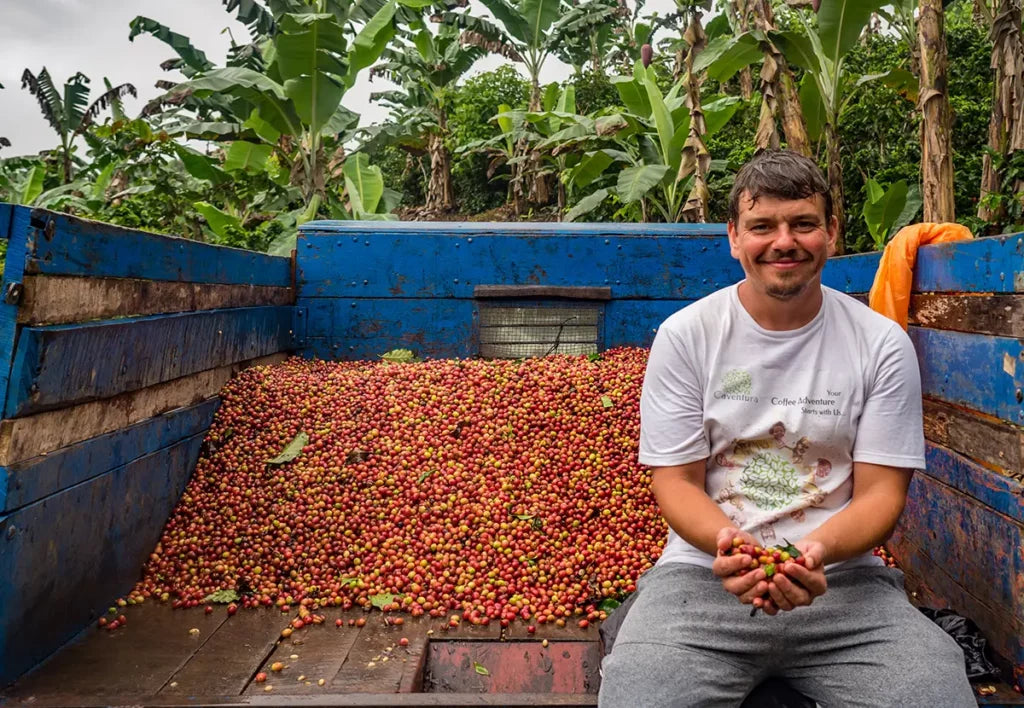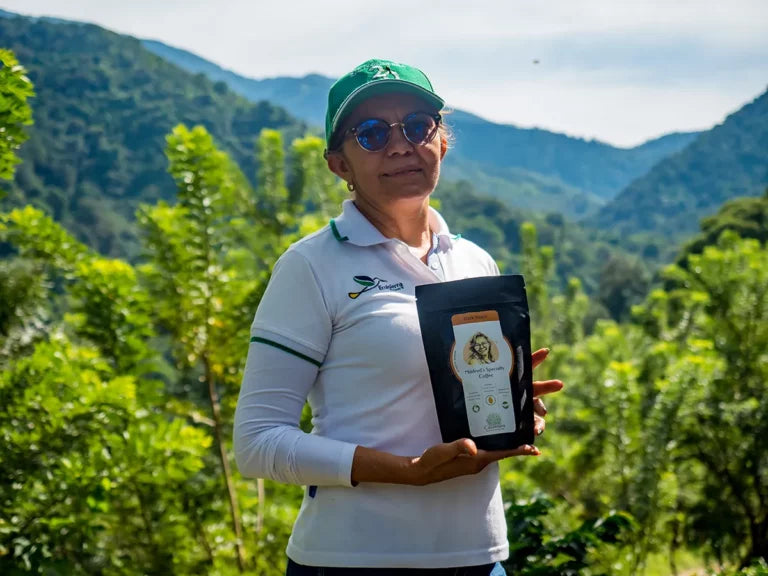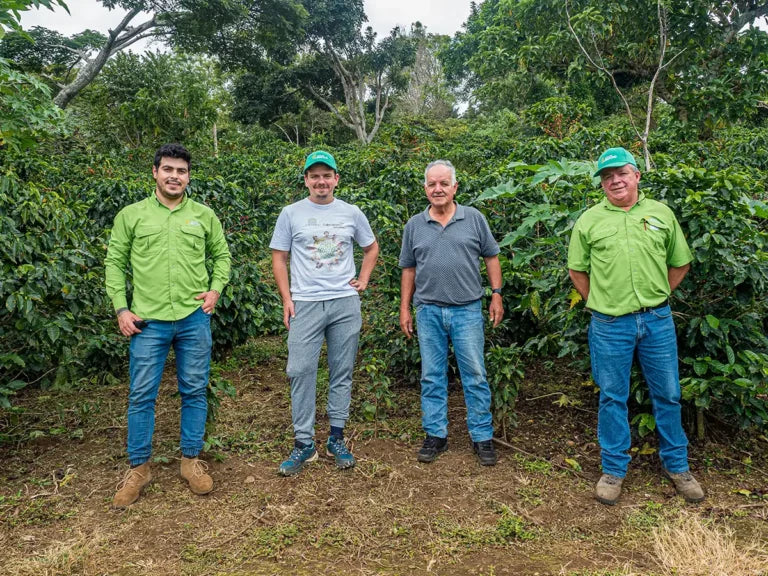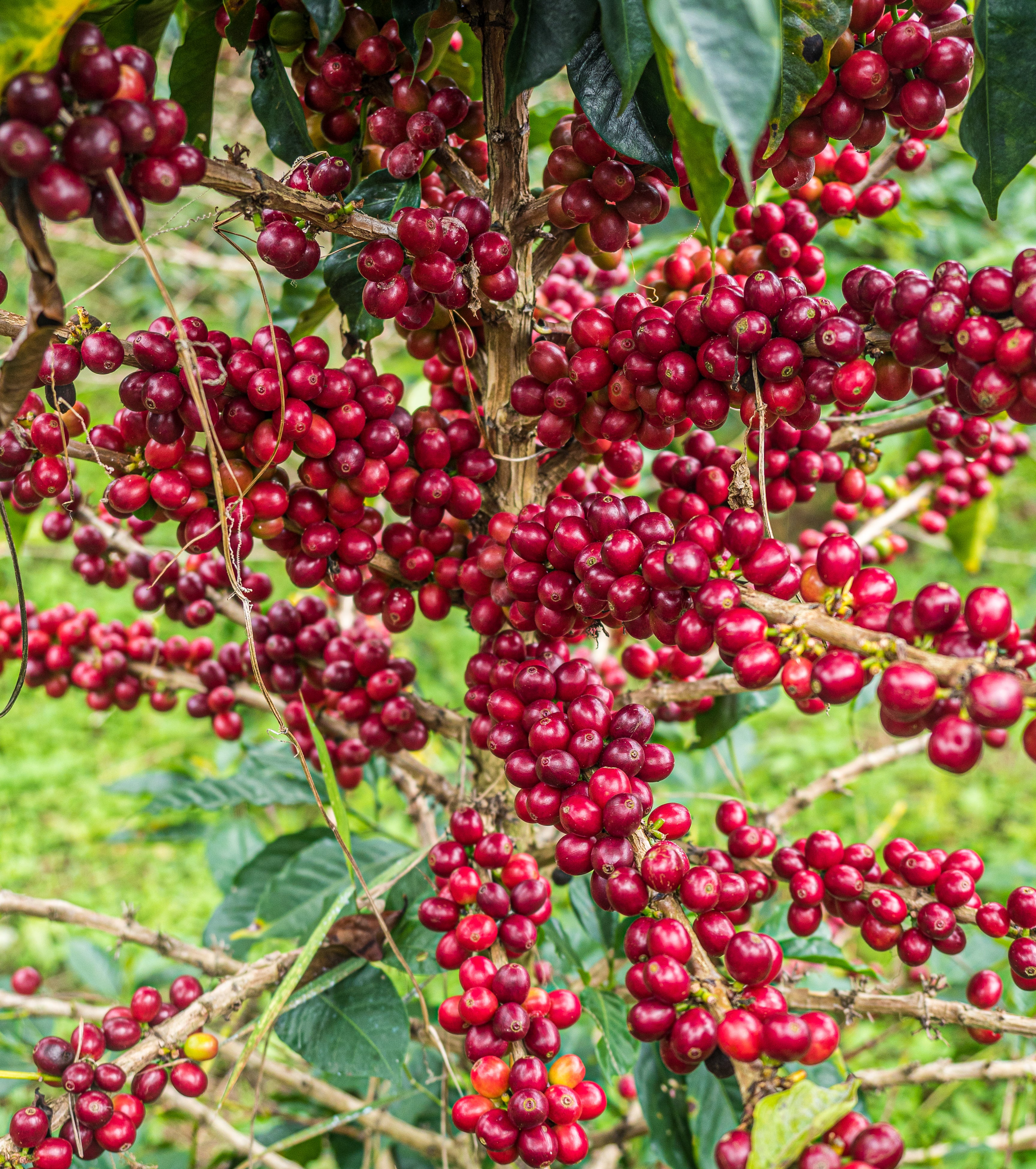Caventura's sustainability strategy
Caventura was founded to be a sustainable company, and therefore we are a sustainable native company. Accordingly, we have had a concrete and actionable sustainability strategy from the very beginning, which we constantly review, revise, and expand. For us to offer you a coffee, the following three criteria must be met:

Already 79% of our coffees are certified organic according to the EU Organic Regulation – and we are working towards making this the case for our entire range soon. But why is organic certification so important?
Organically certified coffees are subject to strict cultivation guidelines. These include climate and environmental protection, maintaining soil fertility, preserving biodiversity, respecting natural cycles and animal welfare, prohibiting chemical and synthetic pesticides, and prohibiting genetically modified organisms (GMOs). Because the certification of our products is carried out by the globally operating company Ecocert , both in the growing regions and in Germany, we ensure that the high EU standards are also met in the producing countries.
Already 79% of our coffees are certified organic according to the EU Organic Regulation – and we are working towards making this the case for our entire range soon. But why is organic certification so important?
Organically certified coffees are subject to strict cultivation guidelines. These include climate and environmental protection, maintaining soil fertility, preserving biodiversity, respecting natural cycles and animal welfare, prohibiting chemical and synthetic pesticides, and prohibiting genetically modified organisms (GMOs). Because the certification of our products is carried out by the globally operating company Ecocert , both in the growing regions and in Germany, we ensure that the high EU standards are also met in the producing countries.

In addition, our coffee production (roasting, grinding, packaging) in Berlin is of course subject to certification. This ensures, for example, that all processes (including transport to the roastery, storage, and shipping to the end customer) exclude any potential mixing with non-organic products.
Furthermore, our coffees are a premium product. We exclusively use coffees that meet our stringent quality standards. We ensure this by having every coffee that makes its way to our roastery, and subsequently to you, tasted and evaluated by a Q-Grader. A Q-Grader is a professionally trained individual certified by the Specialty Coffee Association who assigns each coffee a score on a scale of 0 to 100 based on sensory and visual criteria. All coffees with a score above 80 are classified as specialty coffees. We are even stricter in terms of quality and select only coffees that have received 84 points or more. This allows us to offer our customers a taste experience that truly deserves the title "specialty coffee."
Our current highest-rated coffee is Mildred's Specialty Organic Natural Filter Coffee with a rating of 87.75/100 points.

We work directly with the people who produce our coffees. Since Caventura founder Georgi's trip to South America, we have cultivated a personal and friendly relationship with the people whose portraits appear on our coffee packaging. For example, with producer Mildred Niebles from Sierra Nevada de Santa Marta in northern Colombia, or with Mario Barquero from Costa Rica.
We work directly with the people who produce our coffees. Since Caventura founder Georgi's trip to South America, we have cultivated a personal and friendly relationship with the people whose portraits appear on our coffee packaging. For example, with producer Mildred Niebles from Sierra Nevada de Santa Marta in northern Colombia, or with Mario Barquero from Costa Rica.

Our relationship has several components. First and foremost for us (as mentioned above) is the personal relationship, which isn't limited to a handshake but also involves financial commitments (also known by the trendy name of Direct Trade). Since our inception, we have purchased all the coffees we offer exclusively directly from the cooperatives or growers we work with.

The second key element is long-term cooperation, which provides security and predictability for the growers (and for us as well). We haven't interrupted any relationships so far, but have consistently worked with the same reliable partners year after year. For example, in Colombia, since 2020 we have committed to purchasing the entire harvest of small-scale farmer Jaime García, allowing him to focus on improving the quality of his crop (part of the Empoderamiento project).
The third component is the certification of our social efforts. While we are currently Fairtrade certified, and we consider this an important minimum standard, we also believe that objective third parties must be involved beyond this certification to ensure transparency for all involved. For this reason, we organize trips to the countries of origin for all interested partners, allowing them to see firsthand who we work with and how we work.
Here you can readour detailed article on fair trade and Fairtrade certification. In summary: the current Fairtrade minimum price is €3.15/kg FOB, and since we believe this is insufficient to ensure a dignified livelihood for coffee farmers, we pay at least 148% more, or €7.79/kg FOB.
The second key element is long-term cooperation, which provides security and predictability for the growers (and for us as well). We haven't interrupted any relationships so far, but have consistently worked with the same reliable partners year after year. For example, in Colombia, since 2020 we have committed to purchasing the entire harvest of small-scale farmer Jaime García, allowing him to focus on improving the quality of his crop (part of the Empoderamiento project).
The third component is the certification of our social efforts. While we are currently Fairtrade certified, and we consider this an important minimum standard, we also believe that objective third parties must be involved beyond this certification to ensure transparency for all involved. For this reason, we organize trips to the countries of origin for all interested partners, allowing them to see firsthand who we work with and how we work.
Here you can readour detailed article on fair trade and Fairtrade certification. In summary: the current Fairtrade minimum price is €3.15/kg FOB, and since we believe this is insufficient to ensure a dignified livelihood for coffee farmers, we pay at least 148% more, or €7.79/kg FOB.


Our goal is to minimize the negative environmental impact of our products. We have chosen to use the CO2 footprint as a metric for this, and therefore commissioned a professional calculation of the CO2 footprint of our product range for the first time in 2022.
We've never been under any illusions: coffee is a CO2-intensive indulgence. Production, transport, roasting, brewing – all these steps generate CO2. That's why our message has always been: drink less high-quality coffee rather than a lot of supposedly cheap, low-quality coffee.
The calculation of our CO2 footprint revealed that our coffee generates 9.29 kg of CO2 per kg. But is that a lot or a little? For comparison, conventionally produced coffee, the kind you usually find in the supermarket, has a CO2 footprint of 13.54 kg of CO2 per kg of coffee. That's already a significant difference of 46%. But we're not satisfied with that. That's why we're pursuing a strategy consisting of the following three components:
Our goal is to minimize the negative environmental impact of our products. We have chosen to use the CO2 footprint as a metric for this, and therefore commissioned a professional calculation of the CO2 footprint of our product range for the first time in 2022.
We've never been under any illusions: coffee is a CO2-intensive indulgence. Production, transport, roasting, brewing – all these steps generate CO2. That's why our message has always been: drink less high-quality coffee rather than a lot of supposedly cheap, low-quality coffee.
The calculation of our CO2 footprint revealed that our coffee generates 9.29 kg of CO2 per kg. But is that a lot or a little? For comparison, conventionally produced coffee, the kind you usually find in the supermarket, has a CO2 footprint of 13.54 kg of CO2 per kg of coffee. That's already a significant difference of 46%. But we're not satisfied with that. That's why we're pursuing a strategy consisting of the following three components:

We have a variety of initiatives to avoid a negative impact on the environment.
Because we have built close and trusting relationships with our partners, we don't need to fly to the countries of origin every year. Additionally, the coffee is transported directly to our warehouse in Berlin, thus avoiding transport to intermediaries.
We import our entire annual coffee harvest in a single container to ensure maximum capacity utilization. We bypass indirect sales through retailers and ship the coffee directly to you.
We deliver coffee to our business customers in reusable containers, thereby reducing our CO2 footprint for packaging.
By eliminating flights, intermediaries, retailers, multiple coffee deliveries, etc., we can already significantly reduce our CO2 emissions. Together with our partners, we are currently working to ensure that deliveries within Berlin (and later in other cities) are made using electric cargo bikes, which will further reduce our carbon footprint.
The use of organic coffee has a significant impact on the carbon footprint of our products. Compared to conventionally produced coffee, organic coffee has a 31.3% lower footprint.
Furthermore, we at Caventura have decided to roast our coffee at the Communal Coffee co-roasting space in Berlin. This means that we share a location with other coffee roasters, allowing us to forgo operating our own facility and purchasing our own equipment.
We are also taking action regarding coffee cultivation to minimize our carbon footprint: we now source 7% of our coffee as natural rather than washed . These terms refer to the processing method after the coffee cherries are harvested. The washed process uses 145 liters of water per kilogram of coffee, while the natural process uses 0 liters.
Also important: We currently roast 5% of our coffee locally in the growing countries, which reduces the weight that needs to be transported to Europe by 15%. We plan to increase this share to more than 50% within the next two years. Since the beginning of the year, we have only been roasting full batches on our roasters. This may mean that we cannot deliver the coffee within a week, but it saves energy.
Last but not least: We have already switched from conventional coffee packaging to aluminum-free coffee packaging. Next, we want to switch to fully recyclable and CO2-neutral coffee packaging.
No matter how hard we try, unfortunately some CO2 emissions remain that we cannot yet avoid. We have thoroughly researched the topic of CO2 compensation and have decided to offset our currently unavoidable emissions, knowing that this is a temporary solution.
But what exactly is CO2 compensation? The idea is that individuals and companies can offset their own emissions of climate-damaging gases by purchasing CO2 certificates from climate protection projects – primarily in the Global South. The projects financed by the proceeds from the sale of these certificates promote, for example, the expansion of solar power, biogas plants, and hydropower. Or they support the conservation and reforestation of forest areas.
And what's the criticism? Some people describe CO2 compensation as a modern-day indulgence. Instead of questioning and sustainably changing their own behavior, they're buying a clear conscience. As long as sufficient financial resources are available, consumption can continue indefinitely. However, as you can read in our sustainability strategy, this doesn't apply to Caventura. We are working diligently to sustainably reduce our carbon footprint.
When selecting projects, we chose the forest conservation project in Mataven, Colombia. A large portion of our coffee comes from Colombia, and therefore we believe it is right to ensure that our contribution flows back into the country.
Our partner Climatepartner describes the project as follows:
As the largest REDD+ project in Colombia, this initiative protects 1,150,200 hectares of tropical rainforest and preserves its biodiversity. It provides education, healthcare, sanitation, food security, and other social services for 16,000 Indigenous people. The project works hand in hand with the communities to improve their living conditions and promote sustainable economic growth.
Furthermore, we ship all our packages via the climate-neutral service of Deutsche Post – DHL Go Green.
Join us on our journey
We've embarked on a journey to offer our coffee as sustainably as possible and will continue our efforts in the future. Would you like to support us? Do you perhaps have any ideas on how our coffee can become even more sustainable? Then write to us at: greatcoffee@caventura.com




